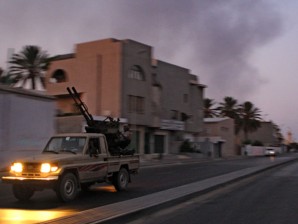Joy and fear in Libyan capital

THE SEARCH FOR GADHAFI. An armored vehicle speeds on the outskirts of Tripoli, as huge smoke rises over the downtown, late Monday, Aug. 22, 2011. Libyan rebels claimed to be in control of most of the Libyan capital on Monday after their lightning advance on Tripoli heralded the fall of Moammar Gadhafi's nearly 42-year regime. Scattered battles erupted, and the mercurial leader's whereabouts remained unknown. (AP Photo/Sergey Ponomarev)
TRIPOLI, Libya— Fierce gunbattles in one neighborhood, celebratory shooting in the next: Tripoli was a mix of jubilation and fear Monday after rebel fighters rode into the Libyan capital in their final push to oust Moammar Gadhafi.
A day after the rebels claimed control over Gadhafi’s last bastion, cars raced down deserted streets to evade snipers, shops remained shuttered and opposition fighters manned makeshift checkpoints of garbage trash bins and car wrecks.
But despite danger lurking behind many corners, many here found ways to rejoice, burning Gadhafi’s green flags, trampling on his posters and flashing victory signs from windows of honking cars circling the main square.
Many here could not believe the speed with which the 42-year-old regime imploded in its final days.
“We came out today to feel a bit of freedom,” said 30-year-old Ashraf Halati, who works in a coffee shop near Green Square, long a symbol of the old regime which rebels now call “Martyr Square.”
Article continues after this advertisement“We don’t believe that this is really happening.”
Article continues after this advertisementHalati and his friends embraced and patted each other on the back. He said his father had urged him to stay indoors because Gadhafi’s forces were still present in the city, but that he ignored the advice because he needed to express his joy.
Just the night before, convoys of rebel fighters had driven into the city of 2 million, facing relatively little resistance from Gadhafi’s troops.
Around midday Monday, rebel fighters took over a women’s police college near the Mediterranean and declared that they would set up their new headquarters there. “We are going to protect the city of Tripoli from all attacks and threats,” fighter Munir al-Ayan said after kneeling and kissing the ground in the compound.
“I was bowing down to the Almighty God who helped us get rid of this brutal dictator,” he later explained.
The compound’s previous inhabitants appeared to have left in haste, and their belongings were not touched.
In one office, women’s green police uniforms dangled from hangers, and black dress boots stood nearby. A computer and a TV screen were still in place. Pictures of Gadhafi adorned the wall. In another room, the police marching band’s instruments were stacked next to a wall, including drums and a trumpet.
But the rebels’ optimistic mood of the morning quickly changed. By mid-afternoon, the college came under heavy fire. Snipers from nearby high-rises aimed at motorists speeding by. An anti-aircraft gun pounded the compound, creating a deafening noise. A handful of rebel fighters inside seemed jumpy and unsure what to do.
Gadhafi loyalists also launched attacks in two other areas of Tripoli, said Ashraf Hussein, a rebel fighter who sat pressed against an inner wall of the compound for safety.
Drivers trying to evade sniper fire ducked into side streets, or stopped at rebel checkpoints to find out whether the next stretch was safe. Booms of mortar rounds and small rockets reverberated across the city, mixed with battle cries of “Allahu Akbar,” or God is Great.
Later Monday, another battle erupted around a school where rebels and journalists had set up camp. Rebels fired small rockets, and Gadhafi troops responded with mortar shells.
The fighting made clear that taking full control of Tripoli will be difficult, especially as long as Gadhafi has not surfaced.
Few civilians ventured into the streets on foot Monday, except for in Green Square. Even there, the old gold market next to the central plaza, normally a tourist draw, stood deserted. A rebel flag was draped over the stone arch at the entrance to the market.
The celebrations were mixed with defiance and derision.
In one street, a man in a white robe danced and clapped as two others near him burned green flags. Another man holding a green flag walked up to a driver, asking if he had a lighter to set the banner on fire.
In the main square, one group chanted “Show us your might now, o frizz-head,” using the derogatory nickname — “shafshufa” in Arabic — for the dictator. Most chants included the word, with Libyans seemingly relishing the chance to express their contempt openly. Under Gadhafi, anyone seen as criticizing the “brother leader” could expect arrest.
A day after the rebels’ triumphant arrival, life was still largely paralyzed in the capital. When one gas station briefly opened to allow rebel vehicles to fill up, civilian motorists also lined up, only to be told all available gas was needed for battle.
In recent months, Gadhafi-controlled areas had suffered extreme fuel shortages, and motorists would often wait for several days to fill a tank.
Abdel-Salam Ali, a hospital nurse waiting in line at a gas station Monday, said his car had been parked for the past month because he could not get fuel. Ali said he had quietly supported the rebels in the past few months, but was unable to express his views. “We were very oppressed,” he said.
The situation in the capital remains far too chaotic to start planning the future, but some already know what kind of country they want.
Mohammed Agami, 22, a medical student, said he dreams of a Libya that has a constitution and rule of law. “We will have a free, democratic country,” he said. “Everyone can say whatever they want, without fear.”